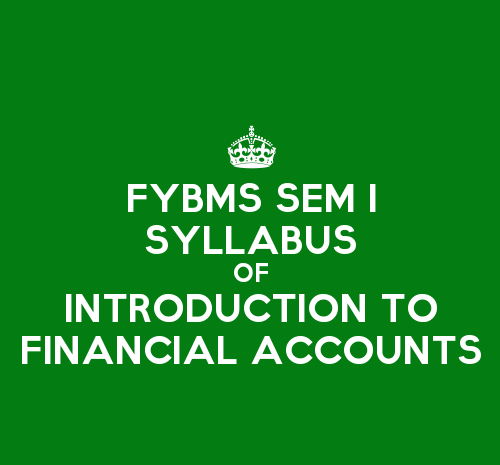UBMSFSI.2 – Introduction to Financial Accounts – 50 lectures: 3 credit.
Introduction to Financial Accounts is a Semester 1 subject of FYBMS. Introduction to Financial Accounts subject is introduced in FYBMS to make BMS students understand and apply the theoretical aspects of accounting methods used for collecting, recording and reporting financial information. The subject helps to analyse and interpret the financial environment in which accounting information is used in managing a business. The subject aims to apply accounting and financial management decision-making techniques to practical situations that is likely to be encouraged by a manager.
The number of lectures required to cover the following topics in Unit 1 are 10:
Meaning and Scope of Accounting:
- Need and development,
- Definition: book keeping and accounting,
- Persons interested in accounting,
- Branches of accounting,
- Objectives of accounting.
Accounting principles:
- Introduction to concepts and conventions.
- Introduction to Accounting Standards: (Meaning and Scope)
- AS 1- Disclosure to Accounting Policies
- AS 6 – Depreciation Accounting
- AS 9 – Revenue Recognition
- AS 10 – Accounting for Fixed Assets.
International Financial Reporting Standards (IFRS):
- Introduction to IFRS
- IAS – 1: Presentation of Financial Statements (Introductory Knowledge)
- IAS – 2: Inventories (Introductory Knowledge)
- Accounting in Computerized Environment:
- Introduction,
- Features and application in various areas of accounting
The number of lectures required to cover the following topics in Unit 2 are 15:
Accounting transactions:
- Accounting cycle,
- Journal,
- Journal proper,
- Opening and closing entries,
- Relationship between journal and ledger: Rules regarding posting: Trial Balance: Subsidiary book (purchase, purchase returns, sales, sales returns and cash book – triple column),
- Bank Reconciliation Statement.
Expenditure:
- Classification of Expenditure – Capital, revenue and deferred revenue expenditure
- Distinction between Capital expenditure and revenue expenses.
- Unusual expenses: Effects of error: Criteria test.
Receipts:
- Capital receipt,
- Revenue receipt,
- Distinction between capital receipts and revenue receipts.
Profit or Loss:
- Revenue profit or loss,
- Capital profit or loss.
The number of lectures required to cover the following topics in Unit 3 are 10:
Depreciation accounting:
- Practical problem based on depreciation using SLM and RBM methods (where provision for depreciation account not maintained)
Preparation of Trial balance:
- Introduction and preparation of trial balance
The number of lectures required to cover the following topics in Unit 4 are 15:
- Final Accounts of a Sole Proprietor
- Introduction to Final Accounts of a Sole Proprietor
- Rectification of errors
- Manufacturing Account, Trading Account, Profit and Loss Account and Balance Sheet
- Preparation and presentation of Final Accounts in horizontal format
- Introduction to Schedule 6 of Companies Act, 1956.
The list of Reference Books for Introduction to Financial Accounts is as follows:
- Financial Accounts (a managerial emphasis) – By Ashok Banerjee, Excel Books
- Fundamental of Accounting and Financial Analysis – By Anil Choudhary, Pearson Education
- Indian Accounting Standards and IFRS for non-financial executives – By T.P. Ghosh, Taxman
- Financial Accounting for Business Managers – By Ashish K. Bhattacharya
- Introduction to Accountancy By T.S. Grewal, S. Chand and Company (P) Ltd., New Delhi
- Advance Accounts by Shukla and Grewal, S. Chand and Company (P) Ltd., New Delhi
- Advanced Accountancy – R.L. Gupta and M. Radhaswamy, S. Chand and Company (P) Ltd., New Delhi
- Modern Accountancy – By Mukherjee and Hanif, Tata Mc. Graw hill and co. Ltd., Mumbai
- Financial Accounting for Management – By Dr. Dinesh Harsalekar, Multi-Tech. Publishing Co. Ltd., Mumbai
- Financial Accounting – By P.C. Tulsian, Pearson Publications, New Delhi
- Accounting Principles – By R.N. Anthony and J.S. Reece, Richard Irwin, Inc
- Financial Accounting – By Monga, J.R. Ahuja, Girish Ahuja and Ashok Shehgal, Mayur Paper Back, Noida
- Compendium of Statement and Standard of Accounting, ICAI
- Indian Accounting Standards – Ashish Bhattacharya, Tata Mc. Graw Hill and Co. Ltd., Mumbai
- Financial Accounting – by Williams, Tata Mc.Graw Hill and Co. Ltd., Mumbai
- Company Accounting Standards by Shrinivasan Anand, Taxman, New Delhi
- Financial Accounting- by V. Rajasekaran, Pearson Publications, New Delhi
- Introduction to Financial Accounting – by Horngren, Pearson Publications, New Delhi
- Financial Accounting – by M. Mukherjee and M. Hanif, Tata McGraw Hill Education Pvt. Ltd., New Delhi
- Financial Accounting a Managerial Perspective – Varadraj B. Bapat, Mehul Raithatha, Tata McGraw Hill Education Pvt. Ltd., New Delhi




44 Comments